May 2016 2nd Edition
May 2016 2nd Edition lebang
Translations
Building a better life for all
Building a better life for all lebangPresident Jacob Zuma says government is working hard to protect South Africans against the effects of the negative global economic downturn on the local economy.
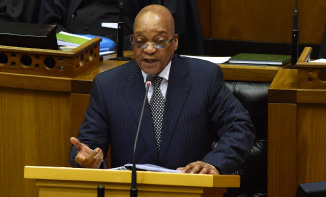 He emphasised that despite the economic challenges, government remains pro-poor and intent on making life better for all, especially for the poor and the working class.
He emphasised that despite the economic challenges, government remains pro-poor and intent on making life better for all, especially for the poor and the working class.
“We have taken concrete measures to reduce the negative impact of the economic downturn of our economy and to prepare for robust growth when the economic cycle turns positive.
“We are also working hard to remove domestic impediments to growth.”
The President said this during The Presidency Budget Vote in Parliament recently.
Growing the economy
Part of government’s efforts to reignite growth and build a better life for all includes implementing the Nine-Point Plan which aims to boost economic growth and create jobs.
“Energy is high up on the agenda. During last year’s Presidency Budget Vote debate our country was facing an acute energy challenge. We have made remarkable progress since then,” said President Zuma.
He added that the Ingula power plant will soon add 330 megawatts of electricity to the national grid and in five years’ time South Africa will have surplus electricity. A renewable energy project for South Africa worth US$180 million was recently approved by the BRICS Development Bank, which will have its African Regional Centre in Johannesburg.
“Most importantly, there has been no load shedding for close to a year now. It is clear that the decisions and steps we took are beginning to bear fruit.”
Developing infrastructure, creating jobs
Government is also using infrastructure as a key instrument to create jobs and to build a better life for all.
“Through the Presidential Infrastructure Coordinating Commission, we have made tremendous strides in fast tracking infrastructure across the country.
“In the past year, we can count the building of 160 new schools, 29 new clinics, the connection of 245 000 houses to electricity and building close to 150 000 new houses. The construction of three universities, 12 technical colleges as well as courts is on-going,” said President Zuma.
He added that the construction of economic infrastructure is also continuing through the delivery of rail, road, dams, bus rapid transit systems, refurbishing ports, building boats and also the three new power stations.
“South Africa is a nation at work, with government leading the way, in building a better life for all.”
Progress on Operation Phakisa
Government launched Operation Phakisa in the Oceans Economy in Durban in 2014, followed by Phakisa projects on the Ideal Clinic and basic education, focusing on information and communication technologies. Phakisa Mining will be launched soon.
Through Operation Phakisa government aims to implement its policies and programmes better, faster and more effectively.
To date much progress has been made.
“In less than two years we have invest-ed billions of rands in infrastructure development.”
These investments include: Transnet’s National Ports Authority’s R7 billion allocation for port infrastructure, R3.6 billion investments in boat-building and a fuel storage facility in Cape Town, the R80 million allocation for rehabilitating and maintaining proclaimed fishing harbours, and the establishment of three new harbours that will provide opportunities for local and rural economic development.
Phakisa Education has delivered electronic administration infrastructure to over 22 000 schools and over 1 500 schools now have internet connectivity, to the benefit of over a million learners across South Africa.
Women empowerment
The President added that billions of rands have been set aside to support women-owned businesses.
He said the Status of Women in the South African Economy Report, which was produced by the Ministry in The Presidency responsible for Women, exposed gaps and showed that more must be done to empower women in the economy.
“In September 2015, I issued a directive to economic cluster departments to place the empowerment of women centrally in their plans and in particular, in the Nine-Point Plan to further grow the economy.
“Progress is being made. The departments of Human Settlements, Public Works and Small Business Development are utilising the approach of set-asides to enhance women’s empowerment,” he noted.
President Zuma said women contractors were allocated over R3 billion of the Human Settlements Development Grant for the 2014/2015 financial year alone.
“This allocation was shared by over 112 female-owned enterprises.”
As the country prepares to commemorate the 60th anniversary of the women’s march to the Union Buildings, the President pointed out that a lot has been done to empower women.
Digital course giving hope to unemployed youth
Digital course giving hope to unemployed youth lebangWhen Aphiwe Cengimbo (24) matriculated in 2011, what he knew for sure was that he wanted to be in the media and digital industry.
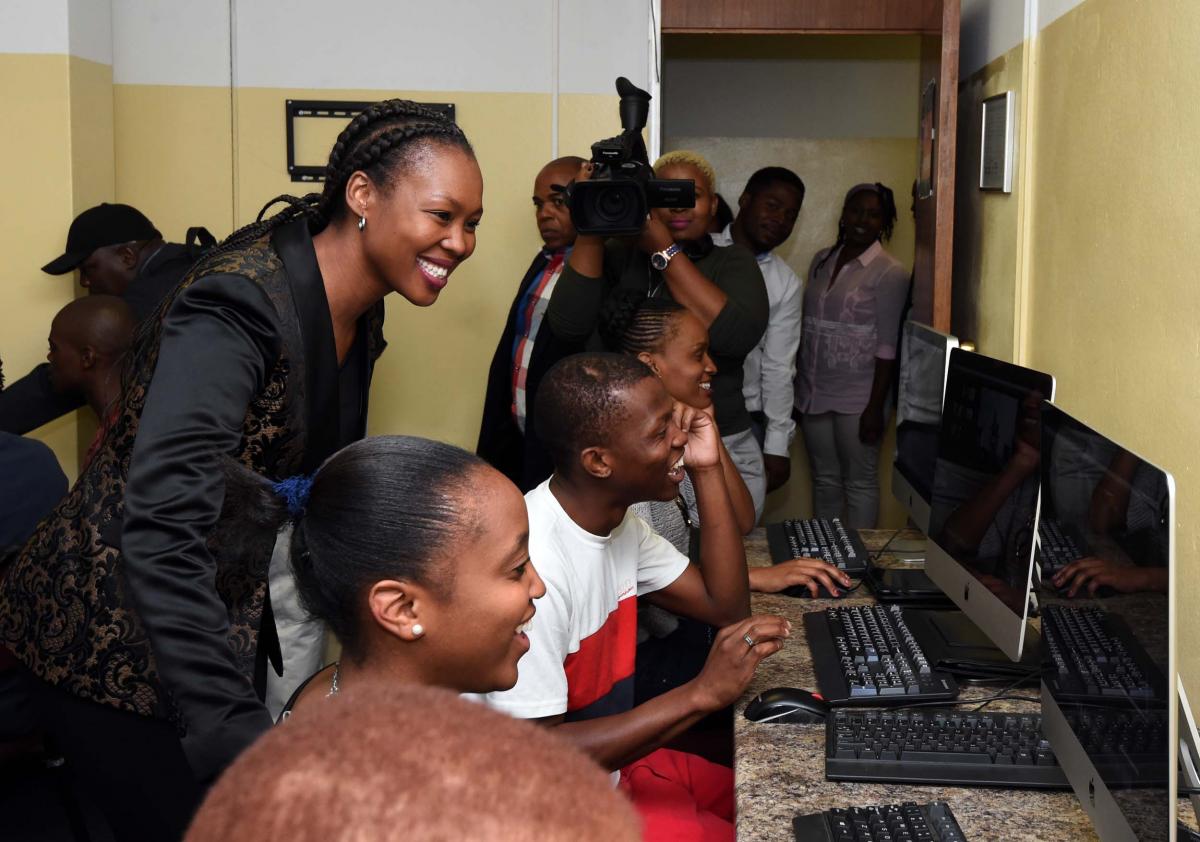 However, with no funding to pursue his dream through a tertiary institution, his dreams were shattered. Determined not to give up on his dream, the youngster from Vosloorus in the East Rand spent his time researching opportunities available to him.
However, with no funding to pursue his dream through a tertiary institution, his dreams were shattered. Determined not to give up on his dream, the youngster from Vosloorus in the East Rand spent his time researching opportunities available to him.
“That is when I came across Communications Deputy Minister Stella Ndabeni-Abrahams’s 2015 Budget Vote Speech, wherein she committed to ensure the training of unemployed youth, learners and teachers in online video editing software.
“After much research about the project, through the National Youth Development Agency database, I registered and started with the project in March,” said Cengimbo.
He is now one of 150 previously unemployed youth from Gauteng, Eastern Cape and Western Cape benefiting from the project.
The pilot project is being rolled out in partnership with the Media, Information and Communication Technologies Sector Education Training Authority (MICT-SETA) and Atos.
The course, according to Atos – who are the facilitators of the course –consists of four modules that focus on communication, sound, camera and editing. The learners are also given tablets in order to carry out course assignments.
Upon completion, the learners will be awarded a NQF 5 national certificate in Film and Television Production.
“I learnt a lot during the few months. It has not been easy but the project is giving me hands-on experience, practical skills and matching them to the theory. I believe that the skills will definitely help me in the future. I am now closer to my dreams,” Cengimbo told Vuk’uzenzele.
Other learners Vuk’uzenzele spoke to hailed the project, saying it is skilling them in line with the latest global trends.
“It’s an all-in-one course which does not limit me only to communication. I am also learning other segments like how to operate the camera and edit content. So no matter where I get a job, I will be an all-rounder,” said learner Zoleka Mazilazila.
Deputy Minister Ndabeni-Abrahams told Vuk’uzenzele during her monitoring visit in Johannesburg recently that the youth who are participating in the project are those who could not afford tertiary institutions, unemployed graduates in the media sector and those who had interest in the media sector.
She hopes to expand the programme to other provinces.
“We would love to see this project in every province to ensure that youth have a skill where they can help local government or municipalities to tell their own stories. But first we need to see how it is being received, address the challenges or what needs to be improved.”
The Deputy Minister hopes the project will help curb youth unemployment.
“As government, we are prepared to partner with anyone in order to bridge the gap and address our challenges so that we can grow the economy of our country,” said Deputy Minister Ndabeni-Abrahams.
MICT-SETA’s Jabu Sibeko said the institution is committed to the project. He encouraged learners to use the opportunity given to them.
“We want to see it as a success. Come August, we want to see you successful … Therefore take the course seriously so that you take the skills and benefit the economy of the country.”
Empowering SA's youth
Empowering SA's youth lebangThe President has outlined the steps that government has taken to ensure that South Africa's youth are given enough tools to enable them to contribute to growing the economy.
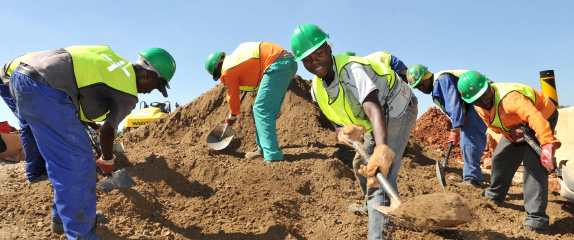 “Growing up in a free South Africa, should enable our youth to pursue their dreams and undertake any career path – as artisans, scientists, business leaders, lawyers or artists,” said President Zuma.
“Growing up in a free South Africa, should enable our youth to pursue their dreams and undertake any career path – as artisans, scientists, business leaders, lawyers or artists,” said President Zuma.
The President said this during The Presidency Budget Vote in Parliament recently.
He stressed that giving young people access to skills development programmes and jobs remained a priority for government.
“The public employment programme is led at a high level in The Presidency, as the Deputy Minister in The Presidency Buti Manamela is the convenor of the Inter-Ministerial Committee on Public Employment.
“We also prioritise skills development. In this regard, the Deputy President [Cyril Ramaphosa] chairs the Human Resource Development Council.”
The President added that Deputy Minister Manamela leads a committee of deputy ministers who form the backbone of the Presidential Youth Working Group.
The Presidential Youth Working Group programme aims to mainstream youth development and empowerment in the work of government.
Several steps have been taken to implement the decisions of the group, which are aligned with the National Youth Policy 2020, said the President.
“Government has also taken concrete and direct steps to encourage youth employment and training through public employment programmes,” he said.
One example is the War on Water Leaks programme by the Department of Water and Sanitation that was launched last year. Through the programme 15 000 young people will be trained and employed as plumbers, artisans and water agents as part of promoting water conservation.
“Every government department has been tasked with ensuring that its programme targets young people for development.
“We have also urged municipalities to prioritise youth employment programmes,” emphasised the President.
Youth mentorship
In June last year, government launched the Mara Mentor youth online mentorship scheme, pairing young entrepreneurs with CEOs of companies.
By April 2016, over 340 000 young people were being mentored by 269 000 mentors.
“We appeal to CEOs and other industry leaders to engage the National Youth Development Agency and avail themselves for this innovative online mentoring.
“Let us all participate in building a better life for our aspirant young entrepreneurs and professionals,” said President Zuma.
Building a better Africa and a better World
Building a better Africa and a better World lebangSouth Africans’ awareness of global issues allows millions of us to speak confidently and interestingly of events unfolding in places such as Syria, Turkey, the United States or India (especially now that the IPL cricket contest is under way in that country).
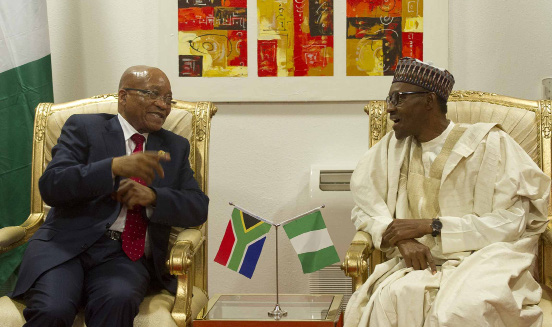 Our consumption of global media causes us to be aware (as we should be) of events in distant destinations, ranging from the crisis around migration or elections to war and sport.
Our consumption of global media causes us to be aware (as we should be) of events in distant destinations, ranging from the crisis around migration or elections to war and sport.
At times it is regrettable that our awareness of the international arena does not extend to the home 54 million South Africans share with 1,2 billion people: our vibrant, culturally rich, beautiful, stable and increasingly industrialised content of Africa.
However, in May each year South Africa observes Africa Month, with Africa Day, May 25, as the highlight.
This is a month in which we celebrate the greatness of our continent and look at ways to address the challenges it continues to face 53 years after the Organisation of African Unity (now the African Union) was founded on May 25 1963.
The words of Ghanaian President Nkwame Nkrumah, one of the founding fathers of the Organisation of African Unity, ring true half a century after he led Ghana to independence from Britain and declared: “We face neither East nor West; we face forward. Freedom is not something that one people can bestow on another as a gift. They claim it as their own and none can take it from them.”
These words are particularly meaningful and relevant to South Africa, given our experience of colonial and apartheid oppression over the course of more than 350 years.
This month, in South Africa, we are celebrating Africa Month under the theme, “Building a Better Africa and a Better World.”
The theme tells us that, in the same way we educate and socialise individuals to be good members of their families and constructive members of their communities and the broader society, South Africa is an integral part of a better Africa and a better world.
I am fortunate and honoured to travel extensively around our continent and to witness up close how the march of development and modernisation is progressing.
This march can be seen in new office towers going up in continental city centres to social housing, new roads, sea ports and tourism destinations that are creating jobs and making our continent a clear choice for visitors and investors from within Africa as well as from other regions of the globe.
We see engineers, bankers, sports heroes, scientists and hard-working small-business entrepreneurs reshaping the African Story and making our continent increasingly successful and stable.
But we also see underdevelopment in many places and poor social and material conditions that sadly cause tens of thousands of Africans to find their way to ports on the northern coast of our continent, and risk their lives on dangerous sea crossings to Europe in search of opportunities they should be enjoying at home.
Africa naturally holds the number one position in South Africa’s programme of international relations.
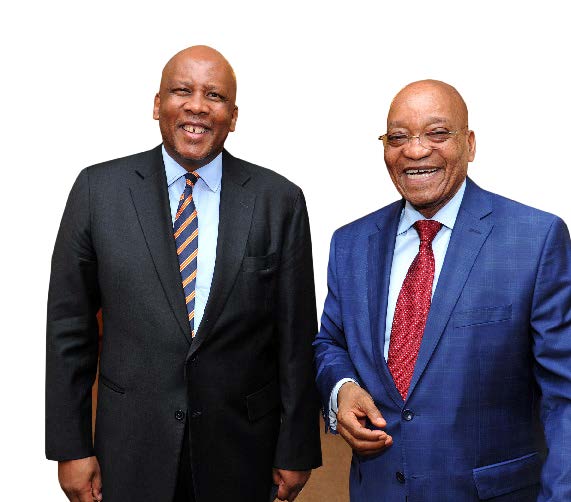 Until 1994, the apartheid state was an outcast of the African continent and the international community, but today we are integral part of the continent and a champion of African development, not just within Africa, but wherever South Africa is active in the global arena.
Until 1994, the apartheid state was an outcast of the African continent and the international community, but today we are integral part of the continent and a champion of African development, not just within Africa, but wherever South Africa is active in the global arena.
South Africa’s diplomatic presence in Africa has grown from seven diplomatic and consular missions in 1994 to 47 in 2015.
Consequently, South Africa’s trade on the continent increased 39 times from R11, 4 billion in 1994 to R385 billion in 2015. South Africa hopes this figure will reach R500 billion rand 2019. As at the end of 2015, 20 percent of our trade was conducted within the African continent.
It is through this engagement that South Africa is home today to many continental compatriots from all parts of our continent; people who bring much-needed skills to our country and help to enrich our cultural diversity and heritage.
Of course we have among us marginalised, poor people seeking basic opportunities. Our task and moral duty is to reach out to such compatriots from our sense of Ubuntu and to offer assistance and care in line with the human rights obligations contained in our Constitution and the statutes of the African Union and United Nations.
Building a Better Africa and a Better World begins with us embracing our African identity and not just our South African identity, and developing an active and positive interest in our home continent.
Africa Month and Africa Day 2016 is a perfect opportunity to launch such an interest if it does not already exist.
The Department of Arts and Culture and the Government Communication and Information System are ideal sources for information about events that will help open South Africans’ imagination to the rich offerings of and developments in our continent.
Make a special effort this month to be or become a proud African citizen.
There is no place like home!
Building a new economic democracy
Building a new economic democracy lebangWorking together with its citizens has proved to be a recipe for success for the City of Johannesburg.
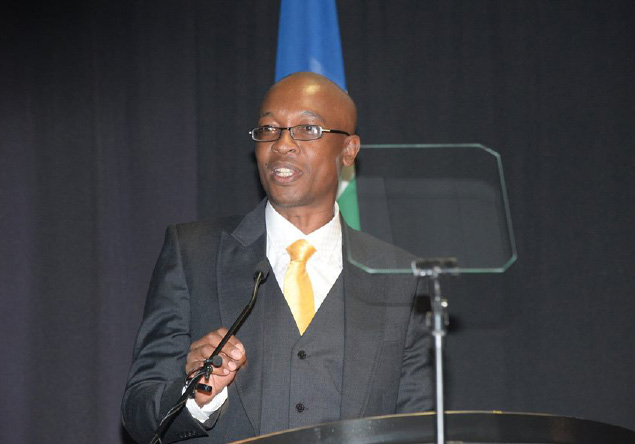 Open conversations between the City and citizens over a nine-week period resulted in the Growth and Development Strategy – Joburg 2040.
Open conversations between the City and citizens over a nine-week period resulted in the Growth and Development Strategy – Joburg 2040.
“In 2011 we convened nine weeks of intensive, open conversations with citizens across the City. We asked you to help us imagine the best possible Joburg of 2040, and to understand the choices we have to make to get there,” said Mayor Parks Tau during the State of the City Address recently.
The strategy aims to enable and build a new economic democracy and redesign the City through the Corridors of Freedom, which is recognised as a globally leading innovation by the United Nations and thus received an initial commitment of R100 million from the Global Environment Facility.
Joburg’s Corridors of Freedom programme is bringing new life to Fleurhof, South Hills, Kliptown, Jabulani, Turffontein, Rosettenville, the student halls and shopping squares of Empire Road, Randburg, Jabulani, Orlando East and Park Station.
It’s also bringing new mixed-use change all along the Louis Botha Corridor, connecting the Inner City, Orange Grove, Alexandra and Sandton.
“The redevelopment of the Paterson Park node in Orange Grove and Norwood commenced with the development of the Louis Botha Corridor and the rollout of the Rea Vaya Phase 1C.”
The City is also rebuilding a state-of-the-art clinic, redeveloping public recreation and sports facilities and revitalising Paterson Park and its waterways.
“It’s about multi-storey buildings rising along the corridor and combining commercial and green space, recreation and cultural amenities, market-rate rentals and social housing.
“This means more people across a range of incomes are able to live richer lives, much closer to where they can live, work and play,” said Mayor Tau.
Another priority for the City is the development of quality, integrated housing in Fleurhof, South Hills, Lufhereng Riverside and Malibongwe Ridge.
Access to basic services
The City has increased access to basic services, including electricity, including through its new micro-grids in informal settlements.
“We were the first City to mitigate load-shedding, with the help of our new smart meters. We have also focused investment on the roads and traffic signals which are the arteries of life and commerce in this great city, upgrading our key bridges and highways as we go.”
During the period under review the City of Joburg conducted a comprehensive audit of its 181 informal settlements, which consist of 168 000 households.
“The vast majority have access to basic water and sanitation,” said Mayor Tau.
The City has electrified 15 of these informal settlements, from Sejwetla to Lawley Station and Thembelihle, and another six will be completed before the end of term.
“We have formalised nearly 29 000 informal sector homes and relocated over 600 households to linked housing projects. We are also actively engaging communities to find long-term solutions to their settlements,” added Mayor Tau.
Empowering business and youth
The City has rolled out the most ambitious youth empowerment programme in the country, partnering with over 250 companies. The programme has been recognised by the Citibank Foundation and the Economist Intelligence Unit as the number one city-level youth strategy globally, alongside Toronto.
“We have aggressively enabled small businesses, and the township economy in particular, and will soon be adding our new JoziBread bakeries and township micro-mechanics as the newest community enterprises empowered by our Jozi@work programme.
“We are building links between the new township economy and our continent leading corporate sector,” he said.
Revitalising the inner city
The Global Financial Centres Index this year found that Johannesburg is the most economically powerful city in Africa.
The inner city received a R14 billion investment via the Urban Development Zone tax incentive, which resulted in the creation of Maboneng, a new Braamfontein.
“We are complementing this with a better street trading management system for the inner city – a trading sector where three of the CBD streets alone turn over in excess of R10-billion a year,” said Mayor Tau.
In addition, the City has installed its own high-capacity fibre network and is ensuring that the Rea Vaya Bus system is the backbone of its new development vision.
Did you know?
The Massive Open Online Varsity - MOOV initiative - which is at the heart of the Vulindlel’ eJozi programme – is already opening up opportunities for 4 000 young Joburgers.
Transforming the City of Tshwane
Transforming the City of Tshwane lebangTshwane is committed to transformation. This and other positive messages emerged when Executive Mayor Councillor Kgosientso Ramokgopa delivered his State of the City Address recently.
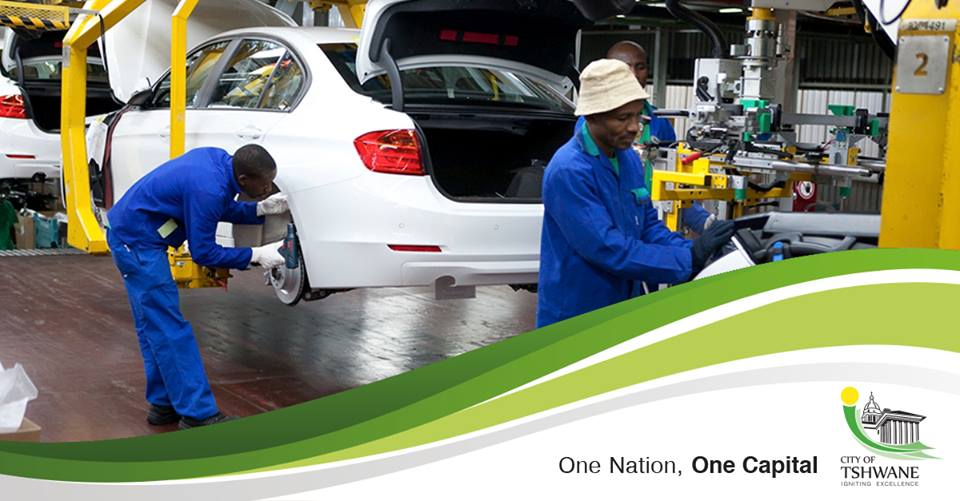 The Mayor said low cost housing would be built within wealthy neighbourhoods, public transport would be extended to the traditionally white areas, the inner city is currently being rejuvenated and that the City had identified land at Fort Klapperkop as a site, if Parliament should move to Gauteng.
The Mayor said low cost housing would be built within wealthy neighbourhoods, public transport would be extended to the traditionally white areas, the inner city is currently being rejuvenated and that the City had identified land at Fort Klapperkop as a site, if Parliament should move to Gauteng.
“I am saying as a City principle we remain unashamed, unapologetic in this agenda. We are confident the vast majority of the population is fully behind us across all race groups, across all ages,” said Mayor Ramokgopa.
He added that Tshwane was ideally positioned to house the legislative seat of government, saying the time was right to bring the nation together within the boundaries of a single capital.
Free Wi-Fi
Mayor Ramokgopa also shared progress on the status one of the City’s flagship projects, TshWi-Fi.
“Our free Wi-Fi project has radically undermined the adverse effects of unaffordable internet access by narrowing the hitherto glaring digital divide,” he said.
The project has the capacity able to serve over two million users across 575 sites, with a further 50 sites to be deployed by the end of the financial year.
“Over the next 18 months, Tshwane will deploy a further 1 848 sites from Bronkhorstspruit to Hammanskraal to Soshanguve to Centurion and indeed the rest of the City,” he added.
Developing townships
In just three years, 62 townships have been developed and 13 townships proclaimed through the Re Aga Tshwane programme, impacting more than 20 000 families per year and relocating approximately 11 202 families from unsuitable living conditions to better permanent housing.
More than R676 million has also been spent on township regeneration projects through the Tsosoloso township renewal programme, the Mayor noted.
Investing in the future
He added that much had been done to develop the City’s youth. The Tshepo 10 000 programme created 508 jobs through technical opportunities. Innovation-based youth programmes such as eKasiLAB, the Youth FabLab programme and the Tshwane Innovation Zone have all been successfully launched.
Service delivery
Mayor Ramokgopa said the City continued to invest a significant amount of resources into its bulk electricity infrastructure programme.
Public lighting infrastructure has increased the level of visibility for pedestrians, motorists and the community through the installation of a total of 11 807 new street lights and 260 new high-mast lights from 2011 to date.
Good electrification progress has been made. In 2011, 79.2 percent of Tshwane residents had access to electricity and by 2015, that figure was marginally below 90 percent.
With regard to health, 98 percent of Tshwane residents have access to primary healthcare services. A total of R152.9 million was spent in the current term on expanding primary healthcare offerings.
By the end of 2014, more than 3 900 metro police officers had been deployed in local-level policing, ensuring more visible policing on the ground.
Did you know?
A Tshwane Automotive City is planned, with BMW, Nissan and Ford continuing to invest in the City to the tune of R36 billion.
Improving access to higher education
Improving access to higher education andileGovernment is committed to providing quality, accessible, affordable, and diverse post-school education and will ensure that academically capable and financially needy South Africans are not left behind.
This is according to Higher Education and Training Minister Blade Nzimande, who recently delivered the department’s Budget Vote in Parliament. The Minister noted that government has allocated billions of rand to the National Student Financial Aid Scheme (NSFAS) to help over 400 000 students pursue their studies. “R4.57 billion is allocated to the NSFAS in 2016/17, made up of R2.54 billion to ensure that 71 753 students who were not, or insufficiently, funded in 2013 to 2015 can pay their debts, and R2.03-billion to ensure that these students and poor students entering universities for the first time can study,” he said.
After President Jacob Zuma announced a zero percent fee increase for institutions of higher learning following nationwide student protests against the cost of education, universities were left with a shortfall of R2.3 billion. “We have provided R1.9 billion of the R2.3 billion shortfall resulting from the agreement. We have reprioritised over R5.7 billion over [the next three years] to universities to ensure that the fee freeze in 2016 does not lead to unmanageable fee increases in the future,” explained the Minister.
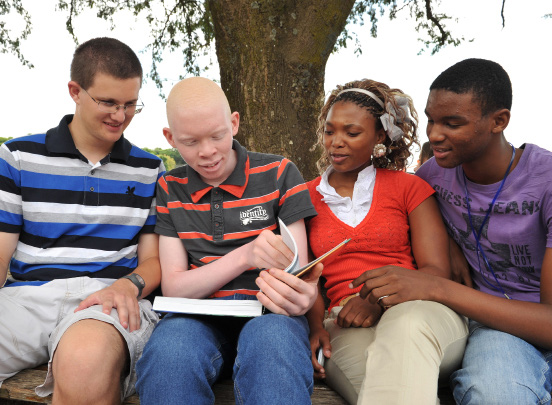
The NSFAS allocations will amount to a 47.3 percent increase in baseline funding for NSFAS in 2016. The Minister said that this, together with the other NSFAS funds, will this year put 205 000 students through university, and another 200 000 through Technical Vocational Education and Training (TVET) colleges. “That is a total of 405 000 students receiving government support, a massive achievement by anybody’s standards.
“We also have a plan for the “missing middle”— students whose family income lies above the NSFAS threshold, but who still can’t afford university. We aim to test our new model in 2017 and fully implement it in 2018,” he said.
The Presidential Commission is investigating the feasibility of fee-free education for university and TVET students, the Minister added.
Student Accommodation
Minister Nzimande added that he would launch the Student Housing Infrastructure Programme this year to address the challenges of student accommodation. He said the department would outline its long-term sustainable programme using funding models and innovative building technologies to provide secure and affordable residences when it convenes the Student Housing Symposium in June. “In the meantime, we are working with the Minister of Public Works, Thulas Nxesi, to identify underutilised or unused government buildings suitable for conversion into affordable and comfortable student housing for both universities and TVET colleges.”
Promoting Healthy Lifestyles
Deputy Minister Mduduzi Manana said to promote healthy lifestyles among the student community, the Department of Higher Education and Training has a campaign called First Things First, administered by Higher Education AIDS (HEAIDS), which provides comprehensive health and wellness services.
This ranges from HIV testing and TB screening, reproductive rights, contraception, maternal health, breast and cervical cancer and lifestyle diseases, among others. He said the number of students that had come forward for testing had increased over the past year. “The programme has covered 174 000 students and workers in 2015 alone, and students who tested for HIV are 79 percent more than those who tested the previous year,” the Deputy Minister noted.
He added nearly 25 million scented male condoms had been distributed in the post school education and training system.
Deputy Minister Manana said the programme was recently recognised as one of the best in the continent, and that the department intends expanding it even further in this financial year. The HEAIDS continuous counselling services were helping students to cope with their HIV-positive status, he added. The Deputy Minister said a student dropped out of university after she tested HIV-positive through the First Things First campaign and couldn’t come to terms with her HIV status. But through HEAIDS’s counselling and support services, she was able to continue with her studies and has one year left before she finishes. “She is one of the ambassadors of First Things First, encouraging students to know their status and giving them counselling and support,” he added.
Rural households get a helping hand
Rural households get a helping hand andileThe Department of Rural Development and Land Reform will intensify the roll out of an initiative that will help alleviate poverty and benefit more than 10 000 rural households in the coming year.
Delivering the department’s Budget Vote in in Parliament recently, Rural Development and Land Reform Minister Gugile Nkwinti said the aim of the One Household, One Hectare programme is to eradicate poverty and create a class of black smallholder farmers, producers and agro-manufacturers.
As part of the initiative, a one hectare allotment (or community garden) is allocated to every needy household. Households are supported to grow their own produce and organised into primary cooperatives linked to the Agri-parks initiative. The programme targets particularly state-owned and what could at best be described as traditional communal land, the Minister said. “The One Household, One Hectare initiative will be rolled out and aligned to the Agri-parks development programme, thus providing the participant households with a solid outlet for marketing their produce,” he explained.
The Minister said initially, each one of the 44 Agri-park districts would have five sites on which the One Household One Hectare initiative will be implemented. This would amount to 220 sites in the 2016/17 financial year. “A minimum of 50 households will participate in each site. This will therefore touch the livelihoods of over 10 500 rural households. The department has set aside R100 million for the initial year of implementation through its Recapitalisation and Development Budget,” he said.
The Agri-parks programme
The department is also moving ahead with the next phase of implementation of the Agri-parks programme across 44 district municipalities for food production, design and construction of new infrastructure, added Minister Nkwinti.
He said R2 billion has been set aside for this purpose for the new financial year. “In accelerating the pace of land reform we are allocating land to smallholder farmers and providing protection to vulnerable communities, including farm labourers and people working on farms. “In this regard, an amount of R89 million has been allocated for providing legal and mediation support for land reform beneficiaries to promote security of tenure. An amount of R791 million has been set aside in this financial year for land acquisition in line with this objective.
50/50 Policy Framework
Minister Nkwinti also commended farmers who had voluntarily participated in the department’s programme, which has seen farmers and farm workers splitting the ownership of commercial farms 50-50 between them. “The President had said in the 2013 State of the Nation Address that he was expecting that by the end of this term, by 2019, we would have piloted 50 of the farms… We appreciate the people who have come forward and said we want to form part of this,” he added.
The Minister said as part of the Strengthening Relative Rights of People Working the Land (50/50 Policy Framework), 10 transactions had been finalised, with about 540 beneficiaries, covering 7 642 hectares. More than 50 submissions from farmers and organisations have been received so far. The programme will be accelerated and R500 million has been set aside for this purpose in the new financial year. Minister Nkwinti added that after the re-opening of the second window of opportunity for the lodgement of land claims, 143 720 claims were lodged by 31 March 2016, with 27 696 claims lodged through the mobile lodgement offices.
New homes make dreams reality
New homes make dreams reality andileAfter years of living in a shack and renting back rooms in people’s yards, Martha Radebe now has a solid roof over her head and is the proud owner of her own home.
Radebe, a 62-year-old pensioner, received her house in Mohlakeng Extension 11 from the Gauteng Department of Human Settlements and the Randfontein Local Municipality last year, making her lifelong dream of owning a house a reality. The housing project has seen hundreds of residents in the area become homeowners for the first time. So far, 570 houses, which are now occupied, have been built as part of the first phase of the housing project. The second phase, which aims to have 629 houses, is nearing completion and houses are also being given to beneficiaries as and when they become available.
Restoring dignity
Sharing her story with Vuk’uzenzele, Radebe, who is also a mother of four and a grandmother of two said, she was thrilled to finally have a roof over her head that she could call her own, adding that this had also restored her pride and dignity. “I was renting for more than 10 years, together with my children, and had to move from one shack or back room to another because of the difficult circumstances. “At one point I lost everything after my shack burned to the ground. I had to rebuild my life and I’m glad that I eventually received this house from government, which has been one of my biggest blessings in life.”
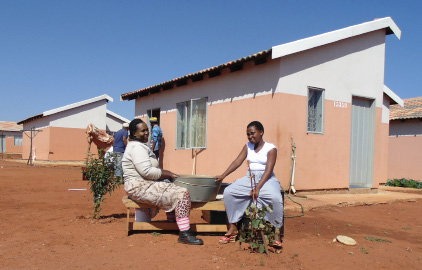 Radebe said she still has to pinch herself to make sure that she is not dreaming and that the house really is hers. “My children no longer feel ashamed of where they stay now and have welcomed this home. Life truly is much better now and I feel like a load has been lifted off my shoulders,” she added.
Radebe said she still has to pinch herself to make sure that she is not dreaming and that the house really is hers. “My children no longer feel ashamed of where they stay now and have welcomed this home. Life truly is much better now and I feel like a load has been lifted off my shoulders,” she added.
Radebe thanked government for the house, saying it had changed her life and that of her children and grandchildren. Another beneficiary of the project, Funiwe Magudu, said receiving her house had given her family peace of mind. “We used to stay at the Zenzele informal settlement before this and I would always stress when the weather was bad. “Our shack was constantly blown by strong winds and damaged by rain and I never thought I’d own my own home,” said Magudu.
Creating jobs
According to Randfontein Local Municipality spokesperson Tshidiso Tlharipe, the municipality is proud of what it has been able to achieve with the project thus far. “We were able to create more than 200 construction job opportunities through this project and this is something we are proud of. “We also appointed six local contractors who are providing us with other services such as the installation of roofs and painting of houses. As a municipality, we decided that our people will not only benefit from the houses, but will benefit from the job opportunities of creating these houses,” said Tlharipe.
The municipality is also constructing a R55 million power station in the area, which is expected to provide electricity to the community once completed. Roads and other infrastructure developments are also being looked at and will be constructed in the near future.
Computer lab brings hope
Computer lab brings hope andileThe lives of learners with an intellectual disability from Hope and Grace Lsen Special School in Limpopo will change for the better.
This was after the MTN SA foundation donated a computer laboratory, which caters for learners with an intellectual disability. The Deputy Minister of Social Development Hendrietta Bogopane-Zulu facilitated the donation. The MTN foundation donated a fully refurbished classroom, which was turned into a computer lab along with 20 computers to the school.
Hope and Grace Lsen Special School principal Mabore Ngoatje said she was delighted to receive the donation. “These computers will assist our learners in learning because it takes time for our learners to grasp learning because they cannot read. With the new computers they will be able to look at a picture and associate it with a word. This means learning will be grasped quicker,” said Ngoatje.
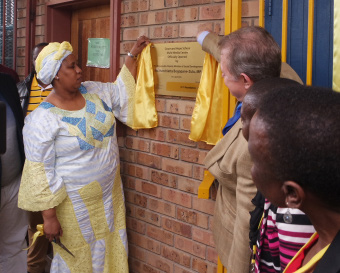 Ngoatje added that the school did not have a curriculum that caters for intellectually impaired learners. With the new computers teaching and learning will be made easier. Grace and Hope Lsen Special School has 475 learners. The school’s vision is to educate intellectually impaired learners to become skilled future leaders in society and offers programmes including creative arts, fashion design as well as interior decor and design lessons. “Now that learning will be made easy for our learners we are confident that learners will not be marginalised by the community and will be included in the job market. Once our learners are taught properly they can do amazing things in the community.”
Ngoatje added that the school did not have a curriculum that caters for intellectually impaired learners. With the new computers teaching and learning will be made easier. Grace and Hope Lsen Special School has 475 learners. The school’s vision is to educate intellectually impaired learners to become skilled future leaders in society and offers programmes including creative arts, fashion design as well as interior decor and design lessons. “Now that learning will be made easy for our learners we are confident that learners will not be marginalised by the community and will be included in the job market. Once our learners are taught properly they can do amazing things in the community.”
The computer lab will also benefit learners from nearby schools such as Alf Makaleng and Luthuli Park primary schools, Mayeke Higher Primary as well as Masedibu High and Dr A.M.S. Makunyane Secondary schools. Deputy Minister Bogopane-Zulu said the laboratory forms part of actions to realise the plans set in the White Paper on the Rights of Persons with Disabilities as approved by Cabinet last year. “The White Paper seeks to, amongst other things, accelerate and implement existing legislation that advocates equality amongst persons with disabilities.
“It further calls for removal of discriminating barriers to access and participation and ensure that persons with disabilities’ rights to equality and access are fully realised,” said Bogopane-Zulu. Bogopane-Zulu said the White Paper is an essential step along the journey of improving the lives of persons with disabilities and moves the country closer to a fully inclusive society for all as envisioned in the Freedom Charter, which explicitly stated that South Africa belongs to all who live in it.
Working towards safer communities
Working towards safer communities andileNew mobile police stations and specialised units will be introduced in the year ahead, helping to increase police visibility and ridding communities of crime. This is just one of the means through which the South Africa Police Service (SAPS) will fight crime that was outlined recently in the Police Ministry’s Budget Vote.
Minister Nkosinathi Nhleko said the SAPS has been allocated a budget of R80.8 billion for the 2016/17 financial year. The spending focus the medium-term will include:
- Addressing current fixed establishments.
- Professionalising the police service through skills development.
- Continued strengthening of the criminal justice system by contributing to the criminal justice sector revamp and modernisation programme.
- Strengthening the resource capability of the Public Order Policing Unit. A total of R1.957 billion has been allocated for this purpose.
“This financial year, we have increased the resourcing of the Directorate for Priority Crime Investigation (Hawks) with funding of R1. 431 billion, which will also cater for the new specialised units. A decision was taken to re-establish the Narcotics Bureau and the Firearm Investigation Combating units because of the need and the outcry of our citizens,” the Minister added.
Safer communities
Deputy Police Minister Maggie Sotyu said the roll out of mobile police stations across the country would help promote safer communities, while also restoring public confidence in the police. “The launch and subsequent roll-out of mobile police stations will start in earnest in May 2016, starting with Khayelitsha Site C, proceeding to Lavender Hill, Crossroads village in Peddie, Botshabelo in the Free State, and other crime hot spots, across the nine provinces,” she added.
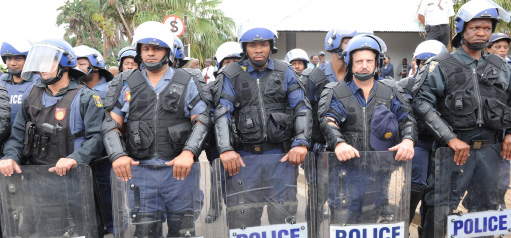 The funding of these police stations will come from the SAPS' national budget. The Deputy Minister noted that the logistics of building a police station involved a lot of departments, which meant they would take some time to complete.
The funding of these police stations will come from the SAPS' national budget. The Deputy Minister noted that the logistics of building a police station involved a lot of departments, which meant they would take some time to complete.
The terrain of most of South African rural areas also obligates government to roll out mobile police stations, she added. The Deputy Minister also emphasised the importance of policing in rural communities.
“We must ensure that the rural communities do not feel as if they are receiving second-rate policing service when compared to the urban areas. We must continue dismantling organised criminals who are bent on stealing valuable livestock from rural communities.” The Deputy Minister said that crime in rural communities was not only about stock theft, but also about gender-based violence, gangsterism, violence and substance abuse in rural schools. The challenging nature of policing rural areas, the distance between villages and isolated nature of many communities could lead to a sense of vulnerability and heightened fear of crime, she noted. “The mobile police station project will strengthen the Department’s Front Line Service Delivery Programme. This is a dedicated programme that encapsulates the professional police member that the people of South Africa require to service them; community-accessible and receptive police service delivery points; a professional and accountable service that the police should render; and establishment of effective stakeholder relations and involvement in the delivery of policing services,” she said.
Protecting vulnerable groups
The Deputy Minister added that the SAPS currently has two networks, which are used to champion the rights of the most vulnerable groups in society, especially in the rural areas. She said the SAPS Women’s Network has been involved in visionary programmes in rural areas that showed an extraordinary duty beyond policing and brought a unique dynamic to community policing.
“This network has supported the elderly victims of brutal rape, ensuring that the perpetrators of these heinous crimes are apprehended and convicted. Furthermore, the SAPS Women’s Network and Men for Change will be embarking on community outreach programme that will be addressing the problem of ukuthwala of young children, in our rural areas, especially in the Eastern Cape.”
The Deputy Minister stressed that while government respected traditions certain practices were unacceptable. We respect a tradition that builds a nation, but we abhor a so-called culture that oppresses, abuses, abducts, and rapes our children in the name of tradition. We will arrest those child abusers who abduct our children in the name of ‘customary marriage’,” she said.
SA benefiting from infrastructure investment
SA benefiting from infrastructure investment andileSouth Africans are reaping the rewards of government’s massive investment in infrastructure through new schools, access to water, electricity connections and jobs, among others.
This was revealed by Economic Development Minister Ebrahim Patel in his recent Budget Vote. In a bid to help stimulate the economy and create jobs, government is investing R1 billion per working day on infrastructure across several sectors. The Minister noted this investment is making a positive impact in the lives of ordinary South Africans. The money has helped government build 160 new schools and about 100 000 new houses; connect 245 000 houses to electricity and bring 1 700 megawatts of new electricity onto the national grid.
The investment has also enabled government to lay 100 kilometres of large water pipelines that can convey billions of litres of water a week to communities and businesses; build 29 new clinics and one new hospital and complete three buildings at the University of Mpumalanga and provide new student accommodation for 4 210 students country-wide. “We made similar progress with the manufacture of buses, taxis and trains; roads that were refurbished, new bus-lanes built and new Wi-Fi sites in urban and rural areas. The direct employment created through infrastructure investment is estimated at 291 000 and with indirect and induced employment, there were 715 000 jobs supported by the state’s infrastructure programme,” he said.
Job creations
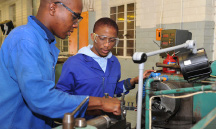 Despite slow economic growth, thousands of jobs were created over the past year, the Minister added. “Jobs numbers have, however, grown in the past calendar year by some 700 000 new jobs, but there are new pressures particularly in mining and related sectors that are of concern to us,” he said. Minister Patel said AB InBev, a foreign company that recently merged with alcohol and soft drinks company SAB Miller, has agreed to spend R1 billion in a commitment that will help create 800 emerging farmers.
Despite slow economic growth, thousands of jobs were created over the past year, the Minister added. “Jobs numbers have, however, grown in the past calendar year by some 700 000 new jobs, but there are new pressures particularly in mining and related sectors that are of concern to us,” he said. Minister Patel said AB InBev, a foreign company that recently merged with alcohol and soft drinks company SAB Miller, has agreed to spend R1 billion in a commitment that will help create 800 emerging farmers.
AB InBev has committed R1 billion to a localisation effort for farmers and other suppliers of inputs. Approximately R610 million of this will be used to support the development of 800 new emerging farmers and 20 new commercial farmers to produce more local barley, hops, maize and malt, with the strategic intent to create at least 2 600 new jobs in agriculture, he added. “We agreed that the company would commit R200 million to enterprise development that includes setting up a business incubation facility, promoting innovations and supporting business coaching facilities to small businesses.”
Educational programmes
AB InBev has committed R190 million to sustainability and educational programmes that include the development of alternative energy sources for their company’s own operations, a commitment to reduce waste and encourage recycling and preserving water. “We have parts of the country that are water scarce, not just during the drought period but in the long term. They have committed to youth programmes, to making scholarships available for engineering … students and to provide 200 additional learner ships. “I think what is significant is the company wants to work with government to ensure that over a number of years, that we turn the country from a net importer of hops to a net exporter of hops and malt,” he added.
Jobs: Justice and Constitutional Development May 2016
Jobs: Justice and Constitutional Development May 2016 andileDirector: Court Manager (3 year Contract) reference: 2016/FTC/01/GPERENCE: 2016/FTC/01/GP
Package: R864 177 – R1 017 972 per annum (All inclusive). The successful candidate will be required to sign a performance agreement.
Requirements: An undergraduate qualification (NQF Level 7) as recognised by SAQA; At least 6-10 years’ experience of which 5 years must be at middle/senior managerial level; Experience in a Management position; Knowledge and experience in office and district administration, financial management, PFMA and Treasury Regulations; Knowledge and understanding of court administration will be an advantage; A valid driver’s licence.
Enquiries: Ms. E Dhlamini (011) 332 9000
Deputy Director: Court interpreting (This is a re-advertisement canditates who previously applied are encouraged to reapply) Reference: 16/94/KZN
Package: R612 822 – R721 878 per annum. The successful candidate will be required to sign a performance agreement.
Requirements: NQF level 4 / Grade 12 and a relevant tertiary qualification at NQF 6 or equivalent qualification; Proficiency in three or more indigenous languages (including IsiZulu) and English; Six years’ experience in court Interpreting of which three years at supervisory level; A valid driver’s licence;
Enquiries: Mr. J.N Mdaka (031) 372 3000
Deputy Director: Supply Chain Management (Procurement) (This is a re-advertisement candidates who previously applied are encouraged to Re-apply) Reference : 2016/38/MP
Package: R612 822 – R721 878 per annum. The successful candidate will be required to sign a performance agreement.
Requirements: An appropriate Degree / National Diploma in Commerce, Accounting or Economics or equivalent qualifications, Minimum of 3 years working experience in Financial environment (Supply Chain Management); At least 3 years should be at management level; Knowledge of Supply Chain Management Framework and Asset Management; Knowledge and understanding of Procurement Policy Framework Act, BBBEE and PFMA; A valid driver‘s licence.
Enquiries: Mr. M.H Hlophe (013) 753 9307
Senior Assistant State Attorney LP5 - LP6 reference: 16/129/SA
Salary: R422 586 – R997 008 per annum. (Salary will be in accordance with OSD determination). The successful candidate will be required to sign a performance agreement.
Requirements : An LLB or 4 years recognized legal qualification; Admission as an Attorney; At least 4 years appropriate post qualification legal/litigation experience; A thorough knowledge of legal practice, office management, accounting systems and trust accounts; The right of appearance in the High Court of South Africa; Understanding of the State’s policies and transformation objective as well as the Constitution of South Africa; A valid driver’s license.
Enquiries: Mr. E Seerane (012) 315 1780
Court manager reference: 16/55/FS (This post is a re-advertisement; candidates who previously applied are encouraged to reapply.)
Salary: R389 145 – R458 385 per annum. The successful candidate will be required to sign a performance agreement.
Requirements: Three (3) years tertiary qualification in Administration and / or National Diploma Service Management (NQF level 5) plus the module on Case Flow Management or relevant equivalent qualification; Three years in management or supervisory experience; Knowledge of Public Financial Management Act (PFMA); Knowledge of Department Financial Instructions (DFI) and Department’s accounting system (JDAS, ICMS, JYP) will an added advantage; A valid driver’s licence. The following will serve as strong recommendations: knowledge and experience in office and district administration.
Enquiries: Ms. N.N Sithole (051) 407 1800.
Assistant Director: Family Advocate reference: 16/56/FS
Salary: R311 784 – R367 254 per annum. The successful candidate will be required to sign a performance agreement.
Requirements: Bachelor`s Degree/National Diploma/NQF Level 6 equivalent; Three years supervisory and public
administration experience; Knowledge and application PFMA, National treasury Regulations, Departmental Financial Instructions as well as Supply chain Management; Knowledge and understanding of Public Service Regulatory Framework as well as the Constitutional of South Africa Elementary knowledge/ understanding of the functions of the Office of the Family Advocate; A valid driver`s licence.
Enquiries: Ms. N.N Sithole (051) 407 1800
Assistant Director: Court Operations ( This is a re-advertisement candidates who previously applied are encouraged to re-apply) Reference: Reference: 2016/39/MP
Salary: R311 784 – R367 254 per annum. The successful candidate will be required to sign a performance agreement.
Requirements: Degree or three year National Diploma in Public Management or Equivalent ,Three years supervisory/ Management experience; Knowledge and understanding of the functions of courts; A valid driver’s licence;
Enquiries: Mr. M.H Hlophe (013) 753 9300/207
Assistant Director: (Service standards ) Organisational Development Reference: 47/16/LMP
Salary: R 311 784 – R 367 254 per annum. The successful candidate will be required to sign a performance agreement.
Requirements: A relevant 3 year Degree/ National Diploma; At least 3 years in Human Resources Management environment of which 2 years should be in Batho- Pele Programmes; A valid driver’s licence.
Enquiries: Mr. T.D Masemola (015) 287 2025
Assistant Director: Payroll and miscellaneous payments (this is a re-advertisement; candidates who previously applied are encouraged to re- apply) Reference : 16/96/KZN
Salary: R311 784 – R367 254 per annum. The successful candidate will be required to sign a performance agreement.
Requirements: Financial Degree or National Diploma at NQF level 6; Three years management /supervisory experience in a financial field; A valid driver’s licence; Knowledge of the PFMA and Treasury Regulations.
Enquiries: Mr J.N. Mdaka (031) 372 3000
Legal Administration Officer (MR3 – MR5) Reference: 16/110/CLO
Salary: R210 837 – R762 630 per annum. (Salary will be in accordance with OSD determination). The successful candidate will be required to sign a performance agreement.
Requirements: An LLB Degree or 4 year recognized legal qualification; At least 2 years appropriate post qualification legal experience; Knowledge of South African Legal system, and legal practices with specific reference to civil litigation; Knowledge of criminal procedures and practice; Experience in providing legal support in civil matters for and against the Department; Knowledge and experience in office administration; A valid driver’s licence.
Enquiries: Miss K. Ngomani (012) 357 8661
Estate Controller EC1 (3 posts)
Reference: 16/111/MAS: Port Elizabeth
Reference: 16/113/MAS: Johannesburg
Reference: 16/127/MAS: Nelspruit
Salary: R162 726 per annum. (Salary will be in accordance with OSD determination). The successful candidate will be required to sign a performance agreement.
Requirements: An LLB degree or recognized four years legal qualification.
Enquiries: Mr. C. Msiza (012) 315 4754
Note: Interested applicants may visit the following website: www.justice.gov.za or www.dpsa.gov.za to view the full job specification of the above positions. Applications must be submitted on Form Z83, obtainable from any Public Service Department or on the internet at www.gov.za. A Z83 form & CV must be accompanied by original certified copies of qualifications and identity document and a driver’s licence where necessary. A SAQA evaluation report must accompany foreign qualifications. Applications that do not comply with the above mentioned requirements will not be considered. All shortlisted candidates for SMS posts will be subjected to a technical exercise that intends to test relevant technical elements of the job, the logistics of which will be communicated. Following the interview and technical exercise, the selection panel will recommend candidates to attend a generic managerial competency assessment (in compliance with the DPSA Directive on the implementation of competency based assessments). Candidate will complete a financial disclosure form and also be required to undergo a security clearance. If the candidate is applying for an OSD post, certificates of service must be attached to the CV.
The DOJ&CD is an equal opportunity employer. In the filling of vacant posts the objectives of section 195 (1) (i) of the Constitution of South Africa, 1996 (Act No: 108 of 1996), the Employment Equity imperatives as defined by the Employment Equity Act, 1998 (Act No: 55 of 1998) and relevant Human Resources policies of the Department will be taken into consideration. Reasonable accommodation shall be applied for People with Disabilities including where drivers licence is a requirement. Shortlisted candidates will be subjected to a personnel vetting process. Correspondence will be limited to short-listed candidates only. If you do not hear from us within 3 months of this advertisement, please accept that your application has been unsuccessful. The department reserves the right not to fill these positions. Women and people with disabilities are encouraged to apply and preference will be given to the EE Target.
Closing date is 30 May 2016
Internship: South African Social Security Agency May 2016
Internship: South African Social Security Agency May 2016 Estelle GreeffSASSA is a dynamic organisation that provides a range of essential services to a diverse group of South Africans. With offices countrywide, our operational structures aspire to
embrace all that is state-of-the-art, offices that are modern and an environment designed to stimulate the worker to achieve, enjoy, progress and prosper.
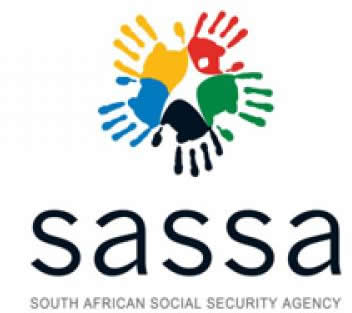 The South African Social Security Agency (SASSA) is inviting unemployed graduates, throughout South Africa, to apply for our Internship Programme.
The South African Social Security Agency (SASSA) is inviting unemployed graduates, throughout South Africa, to apply for our Internship Programme.
The following positions are available at Head Office:
- Legal Services (Qualification: National Diploma/B Tech/LLB/B Proc) (Ref No: SAS In- 01)
- Human Capital Management (Qualification: National Diploma/ B-Tech/ Degree: Human Resource Management/ Training and Development) (Ref No: SAS In-02)
- Facilities and Auxiliary Support (Qualification: National Diploma/ B-Tech/ Degree : Fleet Management / Building Management (Ref No: SAS In- 03)
- ICT (2 posts) (Qualification: National Diploma/ B-Tech/ Degree: IT (Ref No: SAS In- 04)
- Finance (2 posts) (Qualification: National Diploma/ B-Tech/ Degree: Financial Accounting/Purchasing/Supply Chain Management) (Ref No: SAS In- 05)
- Internal Audit (3 posts) (Qualification: National Diploma/ B-Tech/ Degree: Internal Audit/ Auditing, Financial Information Systems /Business Information) (Ref No: SAS In- 06)
- Marketing and Communication (2 posts) (Qualification: National Diploma/ B-Tech/ Degree: Public Relations / Communication/ Journalism) (Ref No: SAS In- 07)
- Grants Administration (Qualification: National Diploma/ B-Tech/ Degree: Service/Operations Management)(Ref No: SAS In- 08)
All applicants must be: between the ages of 18-35 years and be a South African citizen. Students who need Experiential Training. Studied at the recognized institution or higher learning in the Republic of South Africa.
Successful candidates will be appointed on a 12 month internship contract. An all inclusive monthly stipend of R4200 will be paid for a National Diploma and R5200 for a Bachelors Degree.
Closing Date: 18 May 2016
Jobs: South African Social Security Agency May 2016
Jobs: South African Social Security Agency May 2016 Estelle Greeff SASSA is a dynamic organisation that provides a range of essential services to a diverse group of South Africans. With offices countrywide, our operational structures aspire to embrace all that is state-of-the-art, offices that are modern and an environment designed to stimulate the worker to achieve, enjoy, progress and prosper.
SASSA is a dynamic organisation that provides a range of essential services to a diverse group of South Africans. With offices countrywide, our operational structures aspire to embrace all that is state-of-the-art, offices that are modern and an environment designed to stimulate the worker to achieve, enjoy, progress and prosper.
Assistant Manager: Expenditure Administration
Salary: R311 784 - R 367 254 p.a. exclusive of benefits
Location: Head Office – Pretoria (Ref No:6/35)
Closing date: 20 May 2016
Candidates should hold National Diploma/B-Tech/ B.Com/B.Compt with Accounting as a major subject coupled with 3-5 years experience in the various disciplines related to Expenditure Administration; Extensive knowledge, experience, interpretation and application of accrual accounting and GRAP standards; Knowledge of Public Finance Management Act (PFMA), Treasury Regulations on public entity and other relevant regulations; ERP knowledge on Oracle or SAP or AccPacc or accrual accounting compliant systems and a valid driver's license are essential.
The incumbent will ensure that operational plan, budget and resources are optimally implemented and managed; Ensure that all eligible suppliers, all inter departmental claims and all other third parties including employee claim are paid; Undertake reconciliation of credits and all other control account, individual creditors reconciliation and clearing of suspense accounts monthly; Ensure that the accounts payable module is open and closed without exceptions; Assist the Regional Offices with unpaid and consolidation of month end and reports; Assist in preparing audit pack for internal and external audit purposes; Ensure compliance with expenditure policies and practices with applicable GRAP standard, SA-GAAP and IFRS, PFMA, Treasury Regulations, Constitution and other various regulations; Prepare and submit monthly reports for review to manager; Assist in playing an oversight role for accounts payable in the Regional Office.
NB: Target group for the above post is African male/person with eisability and followed by white male and African female and, respectively as at the time of appointment.
Specialist: Equity Management (Disability Management)
Salary: R 262 272 - R 308 943 p.a. exclusive of benefits
Location: Head Office - Pretoria (Ref No.: 06/36)
Closing date: 20 May 2016
Candidates should hold a minimum of three year tertiary qualification coupled with 3-5 years relevant experience. Knowledge and understanding of the EE Act and its Codes of Good Practice and other related prescripts. Strong analytical skills and assertiveness; Good communication skills, Good interpersonal relations, and Project Management skills, Willingness to travel and work under pressure; Computer literacy (Advanced Ms Excel) and A valid driver's license are essential
The incumbent will be responsible for Promoting and marketing Disability in the workplace; Maintenance of National Disability structure ; Conducting and/or implementing disability audit / assessment; Identifying barriers and challenges on achieving Disability objectives; Implementing and Monitoring the Disability policy/Strategy/procedures/guidelines; Preparing Disability reports to stakeholders as and when required; Maintaining and update of Disability database Nationally; Ensure implementation of Affirmative Action measures with regards to disability; Preparing Monthly Disability statistics; Analyzing and providing advice to managers, supervising employees on meeting Disability targets ; provisioning of reasonable accommodations and disability related issues; Supporting Regional Offices on Disability matters; Commemorating special days (International Day of Disability, Casual day, etc.).
NB: Target group for the above post is all race and gender/person with disability as at the time of appointment.
Specialist: SCM Compliance
Salary: R 262 272 - R 308 943 p.a. exclusive of benefits
Location: Head Office – Pretoria (Ref No.:6/37)
Closing date: 20 May 2016
Candidates should hold a B Degree or 3 year tertiary qualification in relevant field coupled with 3-5 years' experience within the Supply Chain Management Compliance field; Knowledge, experience, interpretation and application of accrual accounting and GRAP standards as well as Public Finance Management Act (PFMA), Treasury regulations on Public Entity and other relevant regulations; ERP knowledge on Oracle or SAP will be an added advantage as well as a valid driver's licence are essential.
The incumbent will be responsible for effective administration of contracts; Collate and file a complete set of Contract; Documentation for each contract; Develop and Maintain the Contract register; Communicate early warnings / notifications for contract's expiry; Monitoring of contractor / supplier performance; Ensure the right payment for the right contract; Implement SCM Compliance System; Preserve and maintain a record of original and valid Tax Clearance certificates; Certify the copy of tax clearance certificate as proof of existence of original one; Verify the authenticity of the B-BBEE Certificates; Monitor the expiry of tax clearance certificates; Monitor requisition batches for correctness and completeness through the compliance checklist; Review and update SCM compliance checklist; Monitor the centralized quotation receipt system; Monitor / maintain SCM registers; Update deviations register; Report contract expansion and deviations to National Treasury and Auditor General; Update contracts register; Provide advice and interpretation on supply chain policies and procedures; Provide technical advice to SCM staff and update SCM Department on updates by National Treasury (Regulations and Practice Notes).
NB: Target group for the above post is African Female/Person with Disability and followed by African Male and White Male respectively as at the time of appointment.
Clerk: Expenditure Administration
Salary: R 142 461 - R 167 814 p.a. exclusive of benefits
Location: Head Office - Pretoria (Ref No.: 6/38)
Closing date: 20 May 2016
Candidates should hold senior certificate with accounting or mathematics as subjects; Knowledge, experience, interpretation and application of accrual accounting and GRAP standards, Public Finance Management Act (PFMA), Treasury Regulations on public entity and other relevant regulations, ERP knowledge on Oracle or SAP or AccPacc or accrual accounting compliant systems are essential.
The incumbent will implement the operation plan of the accounts payable unit; Capture transactions on the system; File all payment vouchers; Implement accounts payable policies and practices with applicable GRAP standards, SA-GAAP and IFRS, PFMA, Treasury Regulations, Constitutions and other various regulations.
NB: Target group for the above post is Coloureds/ Indians / Whites Female/Male /Person with Disability, respectively as at the time of appointment.
Senior Manager: Property Management
Salary: R 864 177 - R1 017 972 p.a. inclusive of benefits
Location: Head Office - Pretoria (Ref No: SAS 06/40)
Closing date: 20 May 2016
Candidates should hold an undergraduate qualification (NQF level 7) in Technical qualification in Building Environment (Architecture and Quantity Surveying) as recognized by SAQA coupled with 5 years middle/senior management level experience in the areas of government property and facilities management and Office Accommodation; Experience and knowledge of development of policies and strategies including guidelines; Experience in project management; Expert knowledge of government processes and procedures regarding the procurement of properties; Development of specification and terms of references; Development and management of lease agreement; Knowledge and understanding of the Public Finance Management Act, Public Service Act, Government-wide Immovable Asset Management Act (GIAMA) and all regulations pertaining to property management are essential; The successful candidate should be prepared to travel extensively; Computer literacy and valid driver's licence are essential.
The incumbent will be responsible for: providing strategic direction to the Property Management Unit; Develop and implement policies and strategies for the sourcing of properties; Monitor the implementation of policies and strategies by the Regions; Lead the process of acquiring properties for SASSA; Facilitate agreements with partners in relation to the sharing of properties; Develop norms and standards for the property requirements; Establish and implement Government-wide Immovable Asset Management Act (GIAMA) requirements; Manage contractors in accordance with the Service Level Agreements (SLA's); Monitor the performance of the Regions with regard to property management and advise the General Manager accordingly; Develop, manage and maintain a manual and electronic Property Asset Register for SASSA; Develop and manage User Asset Management Plan for SASSA; Co-ordinate and manage requests/ submissions by Regions and any other relevant duties that may be delegated from time to time.
NB: Target group for the above post is African Female/ Person with Disability followed by African Male and White Female respectively as at the time of appointment.
District Manager
Salary: R 864 177 - R 1 017 972 p.a. inclusive of benefits
Location: Eastern Cape - Sarah Baartman District Office (Ref No: SAS 06/41)
Closing date: 20 May 2016
Candidates should hold an undergraduate qualification (NQF Level 7) as recognized by SAQA in the relevant field coupled with 5 years of experience at a middle/senior managerial level in the relevant field; Knowledge of SASSA's constitutional mandate and relevant policies and legislation; Knowledge of social security management and poverty alleviation matters; Computer literacy and a valid driver's license are essential.
The incumbent will provide the following: Manage all resources attached to the District; Co-ordinate the compilation of strategic and business plan for the District and Local Offices; Manage the Grants Administration services; Manage Human Capital Management, Financial Accounting, Supply Chain Management Services (including fleet, contract and Financial/Budget management) to the District; Handle matters related to the provision of all General Auxiliary Support Services (including Facilities Management, ICT Support and Record Management); Manage Service Level Agreement (SLA) of service providers; Implement service delivery and client relations improvement models; Data acquisition, analysis and management information / reporting.
NB: Target group for the above post is African Male/Person with Disability and followed by African Female respectively as at the time of appointment.
Senior Manager: Human Capital Management
Salary: R 864 177 - R 1 017 972 p.a inclusive of benefits
Location: North West Regional Office - Mmabatho (Ref No: SAS 06/42)
Closing date: 20 May 2016
Candidates should hold an undergraduate qualification (NQF Level 7) as recognized by SAQA coupled with 5 years of experience at a middle/senior managerial level in the Human Capital Management; The incumbent must have a broad understanding of the Public Service Management Framework as well as the SASSA Act; Computer literacy and possession of a valid drivers' licence are essential.
The incumbent will manage and co-ordinate all Human Capital Management activities in the areas of Human Capital Provisioning, Benefits and Service Conditions, etc, Development and Training, implementation of the Skills Development Program, Labour Relations and ensure Human Capital Management policies and legislation are implemented and monitored; Manage the strategic operations of the Unit and the budget thereof; S/he must be able to provide reports written and verbal on strategic and budget areas of the Unit, with analysis thereof as well as drive the Regional Strategic HR priority projects.
NB: Target group for the above post is African Female.
Senior Manager: Customer Care
Salary: R 864 177 - R 1 017 972 p.a inclusive of benefits
Location: North West Regional Office - Mmabatho (Ref No: SAS 06/43)
Closing date: 20 May 2016
Candidates should hold an undergraduate qualification (NQF Level 7) as recognized by SAQA coupled with 5 years of experience at a middle/senior managerial level; Knowledge of SASSA's Constitutional mandate, relevant policies and legislation in Public Management; Knowledge of social security management and poverty alleviation matters; Computer literacy and a valid driver's license are essential.
The incumbent should be responsible for the management of Human, Financial resources and all assets attached to the Unit; Provide a customer care strategy for the Region that is aligned to National directive; Provide strategic guidance and coordinate customer care improvement initiatives; Provide strategic guidance, contact/complaints and call centre management; Management of human and financial resources of the Units; Initiate service delivery improvements in the Unit.
NB: Target group for the above post is African Female.
Important notes: Appointment will be subject to compulsory pre-employment screening in the form of qualification, references, ITC, criminal checks and compulsory competency assessment (where necessary). It is our intention to promote representivity in terms of race, gender, disability and youth through the filling of these posts and candidates whose appointment will promote representivity will receive preference; It is the applicant's responsibility to have foreign qualifications evaluated by the South African Qualifications Authority (SAQA) prior to the selection process; SASSA is under no obligation to fill a post after the advertisement thereof; All shortlisted candidates for SMS posts will be subject to a technical exercise that intends to test the relevant elements technical elements of the job, the logistics of which will be communicated by the department. Following the interview and technical exercise, the selection panel will recommend candidates to attend a generic managerial competency assessment (in compliance with the DPSA directive on the implementation of competency based assessment). The competency assessment will be testing generic managerial competency using the mandated DPSA SMS competency assessment tool.
Please note: All SASSA staff are subject to compulsory Security Vetting on appointment; No faxed or e-mailed applications will be accepted. It is the applicants responsibility to make sure that their application(s) reach the relevant office on or before the closing date.
Applicants interested in applying for these posts should send their applications (CV, recently certified copies of qualifications, driver's license, ID including a fully completed and signed Z83 form) quoting the relevant reference number to the relevant address:
Head Office: Attention: Manager: HCM, Postal Address: SASSA Private Bag x55662, Arcadia, Pretoria, 0001.
Hand delivery: SASSA House, 501 Prodinsa Building, Cnr Steve Biko Road (Beatrix) and Pretorius Street, Arcadia, 0083.
Enquiries: Mr T Moloto (012) 400 2326.
North West: Attention: Manager: HCM, Postal address: Private Bag x 44, Mmabatho, 2735.
Hand Delivery: University Drive, Mmabatho, 2735.
Enquiries: Mr Malesela Sekhaolelo on 018 389 4059.
Eastern Cape: Attention: Manager: HCM, SASSA, Private Bag X9001, East London 5201.
Hand delivered: SASSA Office Park, BKB Building, corner Fitzpatrick and Merino Road, Quigney, East London.
Enquiries: Ms Z. Nqowana 043 707 6522.
If you have not been contacted within 3 months after the closing date of the advertisement, please accept that your application has been unsuccessful.
Visit us at www.sassa.gov.za or toll free: 0800 60 10 11
Sweet harvest for sugar cane farmers
Sweet harvest for sugar cane farmers Estelle GreeffFive community-based cooperatives that plant sugar cane in the area of Qoloqolo in the Umzumbe Local Municipality, KwaZulu-Natal (KZN), will have a sweet sugar cane harvest this year. This comes after MEC for KZN Agriculture and Rural Development (KZNDARD) Cyril Xaba officially launched a R14 million sugar cane project in partnership with the South African Sugar Association (SASA).
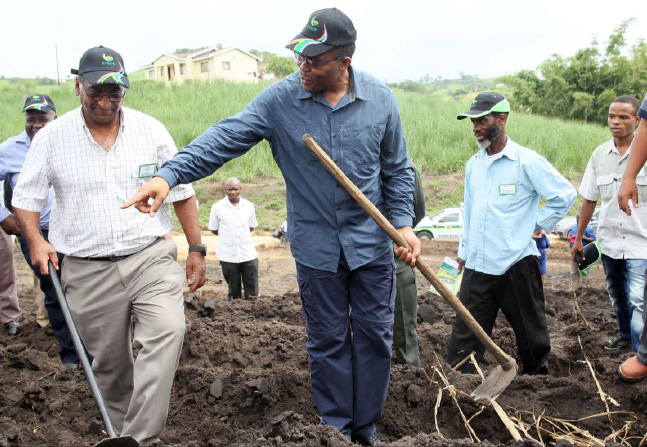 MEC Xaba first visited the area in 2014 when community members asked for government’s assistance to help grow and develop the area.
MEC Xaba first visited the area in 2014 when community members asked for government’s assistance to help grow and develop the area.
He realised at the time that the area was rich in sugar cane as a commodity and most of the plantations were owned and controlled by community-based cooperatives. This prompted government to look for ways to support these small cane growers.
The funding will see the fencing of 70km of communal land, ratoon management across 1 207 hectares, nine land reform projects, the planting of a further 102 hectares of land and the establishment of five small-scale grower cooperatives.
“This is what I constantly advocate to all farmers in the province; working together for the betterment of the lives of the people of this area. This is a clear sign that together, we can really do more,” said MEC Xaba, during a visit to one of the community-owned sugar plantations.
Zebron Phewa of Sizweleni Cooperative couldn’t hold back tears of joy when the MEC arrived to view the work they doing. “This is the happiest day of my life. I’m used to farming directly from my pocket, which hindered my growth and further impacted on the livelihood of my family, but now government has heard our cries and they are here to answer,” said an emotional Phewa.
Another beneficiary, Norman Cele of Qoloqolo Cooperative, said they never thought that the department would help people from a deep rural area like Qoloqolo.
“It has been our dream to expand our plantation but we could not fulfill our dream because we didn’t have financial muscle. We thank the department for helping us. We promise the department that the resources given to us today will not be a waste,” he said.
The MEC was so moved by the progress and unity shown that he committed a further
R55 million for the growth of this project.
MEC Xaba reminded the community that agriculture was a science and a business and with government support, the expansion and development of a progressive value chain would be ensured.
Prize money oils farmer’s entrepreneurial spirit
Prize money oils farmer’s entrepreneurial spirit Estelle GreeffJulia Thandeka Shungube (39) is doing her bit to uplift her corner of rural South Africa, thanks to receiving a helping hand from government and her can-do attitude.
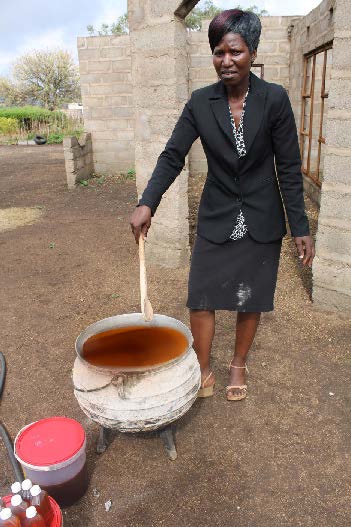 As the 2015 winner of both the Mpumalanga and national legs of the Female Entrepreneur Awards Programme, Shungube (39) received total prize money of R750 000.
As the 2015 winner of both the Mpumalanga and national legs of the Female Entrepreneur Awards Programme, Shungube (39) received total prize money of R750 000.
The competition is a joint venture between the Department of Agriculture, Forestry and Fisheries, the provinces and key partners in the sector. It acknowledges, encourages and increases the participation of all women in the sector, including the youth and those with disabilities. Its long-term goal is to assist female subsistence and smallholder producers to become commercial entrepreneurs.
Growing up in Mbangwane Village, a rural area that falls within the boundaries of the Nkomazi Local Municipality in Mpumalanga, Shungube is the proud owner of Siphandane General Trading, which manufactures castor oil.
Her grandmother, who made castor oil only for family and friends, passed on her knowledge to Shungube.
In 1998 Shungube worked as a security guard but wanted to do something else to earn money as she was the family’s sole bread winner. When her grandmother passed away she thought of turning her method of producing castor oil into a business.
“I heard a business talk show on my local radio station, Ligwalagwala FM, which mentioned a free workshop hosted by various government agencies to encourage the youth to start their own business,” said Shungube.
“I was working the night shift as a security guard, but attended the workshop during the day.”
The Small Enterprise Development Agency in Malelane helped Shungube to develop a business plan, which she entered into a competition run by the Mpumalanga Department of Economic Development in 2009. She won the competition and used her prize money to fence a 10-hectare piece of land. The chief of Mbangwane Village gave her the land so that she could start growing Ricinus communis, the castor oil plant, locally known as the Mhlafushwa tree.
“In 2010, while still working night shift as a security guard, I won R10 000 in a competition run by the National Youth Development Agency, and used the prize money to buy a laptop and printer,” says Shungube.
The same year she won another competition and used the R25 000 prize money to drill a borehole on the land.
Shungube carried on working as a security guard at night until 2015 when she won the Mpumalanga Female Entrepreneur Awards Programme. She went on to win the national competition in August 2015.
“Everything that I have achieved so far has been with prize money from competitions; I haven’t received any government grants at this stage,” said Shungube, whose dream is to have a structure built in which to house machinery needed to grow her business.
Shungube, still producing castor oil by hand, has grown her company from 10 to 20 employees from the local community.
“Unfortunately, due to the drought, all planting has been put on hold. Planting is also seasonal, so it can only take place in the first three months of the year,” she said.
This is a great pity as Shungube’s castor oil is already in demand. She has increased the size of her land to 13 hectares and supplies local farmers in the Kruger Lowveld region, who sell her product to their customers.
“Another dream is to be able to supply castor oil nationally, but I can’t do this until I have the machinery needed to support such large production quantities,” said Shungube, who’s really passionate about farming.
Shungube is determined to make a difference in her community when it comes to economic development and job opportunities.
“Farming is in my heart. I work hard and believe in knocking on many doors, for assistance, until one is opened for me,” said Shungube, because she’s determined to make a difference
Inkunzi’isematholeni youth in business competition now open
Inkunzi’isematholeni youth in business competition now open Estelle GreeffEntries for the Inkunzi’isematholeni Youth in Business competition are officially open and youth aged between 18 and 35 living in rural and urban areas of KwaZulu-Natal are invited to enter.
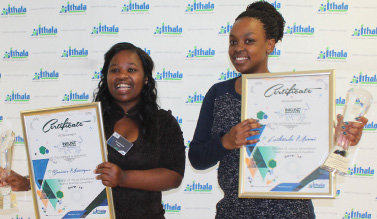 Inkunzi’isematholeni Youth in Business is an annual competition run by Ithala Development Finance Corporation to promote entrepreneurship and skills development among the youth in KwaZulu-Natal.
Inkunzi’isematholeni Youth in Business is an annual competition run by Ithala Development Finance Corporation to promote entrepreneurship and skills development among the youth in KwaZulu-Natal.
The competition aims to recognise young people with innovative and sustainable business concepts.
The programme empowers aspiring entrepreneurs to turn their creative concepts into fully operational businesses by providing start-up capital and the necessary business support to help them launch, manage and run their businesses successfully.
The flagship campaign was launched by Ithala in 2014 in an effort to tackle unemployment by encouraging youth to consider self-employment as a job option.
Unemployment among the youth aged 15 to 24 was recently reported by the World Bank’s South Africa economic update to be almost 50 percent double the national rate.
“Against a backdrop of overwhelming unemployment among our youth, this programme aims to make a small but tangible contribution to wrench young entrepreneurs from the ranks of the unemployed to actually running sustainable enterprises that will contribute to economic growth and job creation,” said Mano Muthusamy, Acting Business Finance Executive at Ithala Development Finance Corporation.
The key focus of the campaign is to drive innovation, specifically within the green economy. It is for this reason that the theme for 2016 is “Think Innovation, Think Green”.
“People often have bright ideas about new or improved products, services or processes. Generating ideas and being innovative is integral to business success. Research has shown that innovation, when properly managed, produces a higher rate of return than other forms of investment,” said Muthusamy.
This year, Ithala is supported by several strategic partners to ensure the initiative is a resounding success.
One such business is Invo Tech a business incubator that assists entrepreneurs to develop their innovative ideas to viable businesses
“We look into businesses that fall under our sectors of operation which include green technology, the digital creative industry, software and mobile application sectors.
“We saw a need to offer our services to the Inkunzi’isematholeni programme to ensure we continually groom young people in business,” said Nons Khanyile, Business Development Manager at Invo Tech.
Anitha Ramsuran, Manager: Innovation Skills Development at the Technology Innovation Agency said: “We are thrilled to partner with Ithala on such a creative initiative for the youth.
The Technology Innovation Agency's mandate is to promote and develop technological innovation in order to improve economic growth.
“Working together with Ithala, we are going to support and guide these young people and help them better their future in business,” said Ramsuran.
Competition details
Winners of the 2016 competition will each receive business finance assistance of up to R250 000. Depending on the requirements of each business, assistance will include:
- Aftercare programme by the Technology Innovation Agency
- Aftercare programme by Invo Tech
- Business mentorship
- Product development
- Business skills development programmes.
- Patenting of inventions
Source: Ithala Development Finance Corporation
Learners get a taste of life behind bars
Learners get a taste of life behind bars Estelle GreeffThe Department of Correctional Services in Gauteng has introduced an innovative way to prevent troubled learners from becoming criminals.
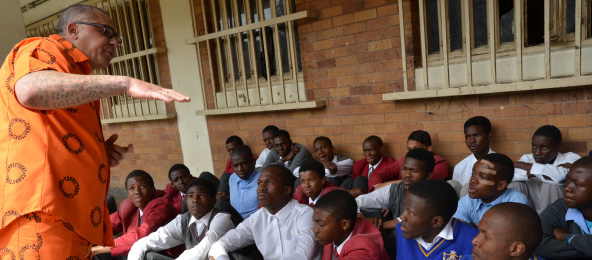 A partnership between the Department of Correctional Services and Gauteng Department of Education sees youngsters who are battling with certain negative behaviours being given a taste of living in a correctional centre.
A partnership between the Department of Correctional Services and Gauteng Department of Education sees youngsters who are battling with certain negative behaviours being given a taste of living in a correctional centre.
The orientation programme exposes learners to correctional facilities and offenders to discourage immoral behaviour.
Project manager Samantha Ramsewaki from the Johannesburg Community Corrections Office within the Department of Correctional Services, said young people who visit the correctional centres are those who are disruptive in class and have serious behavioural problems, such as substance abuse, stealing and gangsterism.
“Many of these youngsters see themselves as invincible and resist following rules,” said Ramsewaki.
Ramsewaki added that the facilitators, who are also inmates, give a detailed picture of what life is like in a correctional centre.
“This is to give the youngsters a taste of the kind of territorial behaviour found in correctional centres and the feeling of losing one’s freedom,” said Ramsewaki.
Mahimi Sehlwane, a learner who was part of the programme, said that visiting the correctional centre was an eye-opening experience.
“I really want to change my behaviour especially since it might land me in the shoes of the offenders in this correctional centre,” said Sehlwane.
Teaching learners a lesson
Since 2012, about 12 000 learners have been part of this orientation programme and the Department of Basic Education (DBE) in Gauteng plans to include the programme in Life Orientation in schools.
Gladys Msimango, project manager from the Gauteng DBE, said this programme has already involved 15 districts in the province.
“Once learners have been orientated in a correctional centre, their behaviour changes and we receive positive feedback from the teachers which means the project is making an impact,” said Msimango.
The reality of life in a correctional centre
The learners are selected from schools around Gauteng and parents and guardians give permission for their involvement in the programme.
On Tuesdays, Wednesdays and Thursdays, between 50 and 100 learners arrive at the Johannesburg Management Correctional Centre in buses.
Male learners are escorted to the juvenile remand detainee facility and locked up with three trained remand detainees of similar age.
“The one-on-one interaction with detainees allows learners to digest the reality of crime and its consequences,” Ramsewaki noted.
The learners' sudden awareness that everything is different happens in the blink of an eye. They hear the clang of the iron gate as it locks, the lights go out, and the atmosphere intensifies.
Without warning, there is shouting and banging on the walls by the three remand detainees who claim their territory.
There are only three detainees and more than 40 teenage boys in a cell. This scenario demonstrates the potential dangers that exist behind bars in overcrowded cells.
In a nearby centre, the girls undergo a similar experience of being locked up in one cell with inmates who give the learners an experience of what life is really like behind bars.
During the programme, learners also listen to a talk given by Bernard Mitchel (45), a former gang member who originates from Cape Town.
Mitchel is serving his sentence at Johannesburg Management Correctional Centre.
He became a gang member at the age of 10 and was imprisoned for the first time in 1986 when he was 14.
Since then he has been in and out of correctional centres and was for a long time deeply involved in a number of gangs.
“You may take for granted all the privileges that you have right now in your lives. Being in a correctional centre is not easy. I have no control over my son’s life, who also decided to follow in my footsteps and be part of a gang,” Mitchel explained to the learners.
Mitchel said he gives the talks as a way of giving back to the community.
Towards the end of the programme, learners watch a stage performance titled: ‘Crime does not pay’ in which offenders express their life experiences through poetry and dramatisation.
*Neliswa Mzimba works for the Department of Correctional Services.
Some of the ways the proposed Road Accident Benefit Scheme
Some of the ways the proposed Road Accident Benefit Scheme JoyFor the first time in the history of road accident compensation in South Africa, the proposed new Road Accident Benefit Scheme Administrator (RABSA), as envisaged in the Road Accident Fund Benefit Scheme Bill published in Government Gazette No. 37612 on 9 May 2014, will offer benefits based on social security principles.
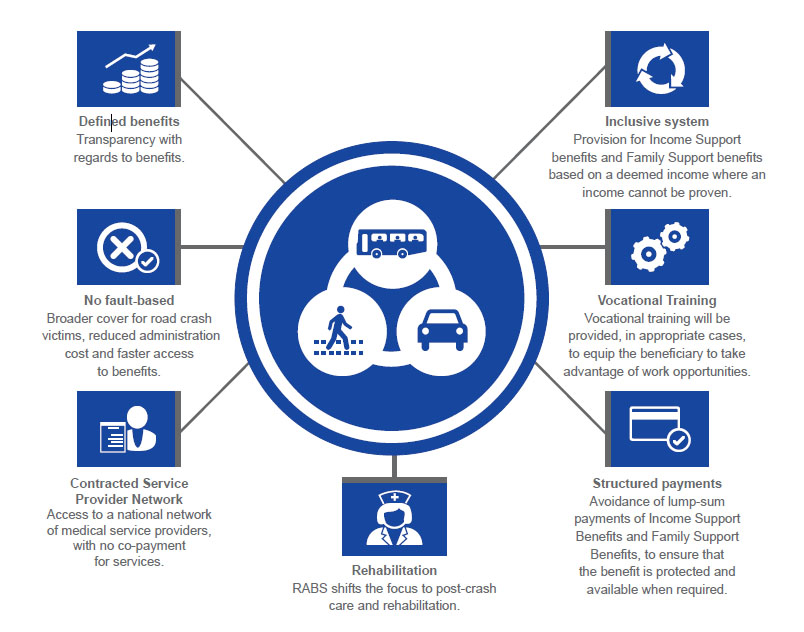
It’s your right to know the facts about RABS
Road Accident Benefit Scheme – an inclusive scheme for all.
Scam alert to suppliers and service providers of Dept of Health
Scam alert to suppliers and service providers of Dept of Health JoyHigh scam alert to suppliers and service providers of the National Department of Health
It has come to the attention of the National Department of Health (NDoH) that there are certain unscrupulous companies and individuals who are defrauding unsuspecting businesses disguised as representatives of the Department.
The scam involves the fraudsters using the departmental letterheads to send out fake tenders to companies and requests to supply equipment and goods.
The contact person’s name and telephone number on the letter is also not the same as the NDoH in Pretoria.
When searching on the Internet for the address of the company that has sent the fake tender document, the address does not exist.
The banking details are in a private name and not company name. Government will never ask you to deposit any funds for any business transaction.
The NDoH has alerted the relevant law enforcement authorities to investigate this scam to protect legitimate businesses as well as the name of the Department.
Should you suspect that you are a victim of a scam, you must urgently contact the police and inform the National Department of Health.
Examples of e-mails these fraudsters are using:
- doh@treasury-gov.org.za
- ghd@gautenghealth-gov.org.za
- health@mphumalang-gov.org.za
- NDOH@nationalhealth-gov.org.za
Government e-mails DO NOT have org in their e-mail addresses. All of these fraudsters also use the same or very similar telephone numbers. Although such number with an area code 012 looks like a landline, it is not fixed to any property.
The Department will never send you an e-mail asking you to supply equipment and goods without a purchase/order number. The National Department of Health does not procure goods for another level of Government.
The Department will not be liable for actions that result in companies or individuals being resultant victims of such a scam.
Should you suspect that you are a victim of a scam using the National Department of Health’s name, please contact Popo Maja,tel. (012) 395-9591 or e-mail: majap@health.gov.za
Growing township businesses
Growing township businesses JoyThe Gauteng Department of Economic Development (GDED) and its agency Gauteng Enterprise Propeller (GEP) in partnership with Pick n Pay (PnP) are changing the way of doing business in townships.
As part of revitalising township economies, the GDED, GEP and PnP have partnered to empower spaza shops and help grow their businesses.
The partnership involves spaza shops in townships buying stock from PnP in bulk and selling in townships using PnP’s model, infrastructure, corporate branding and pricing.
Chief Executive Officer of the GEP Leah Manenzhe said the partnership between the department, the GEP and PnP has been identified as a key pillar that will help in growing the township economy.
The GEP’s main objective is to develop small businesses. This includes financial and non-financial support to small, medium and micro-enterprises and co-operatives.
“Government continues to create a conducive environment for businesses to thrive, but needs the private sector to collaborate with us for a greater impact.
“Through this partnership, we want to see a transformation of the spaza businesses from just being a stop-gap supplier to being the main players in their townships,” said Manenzhe.
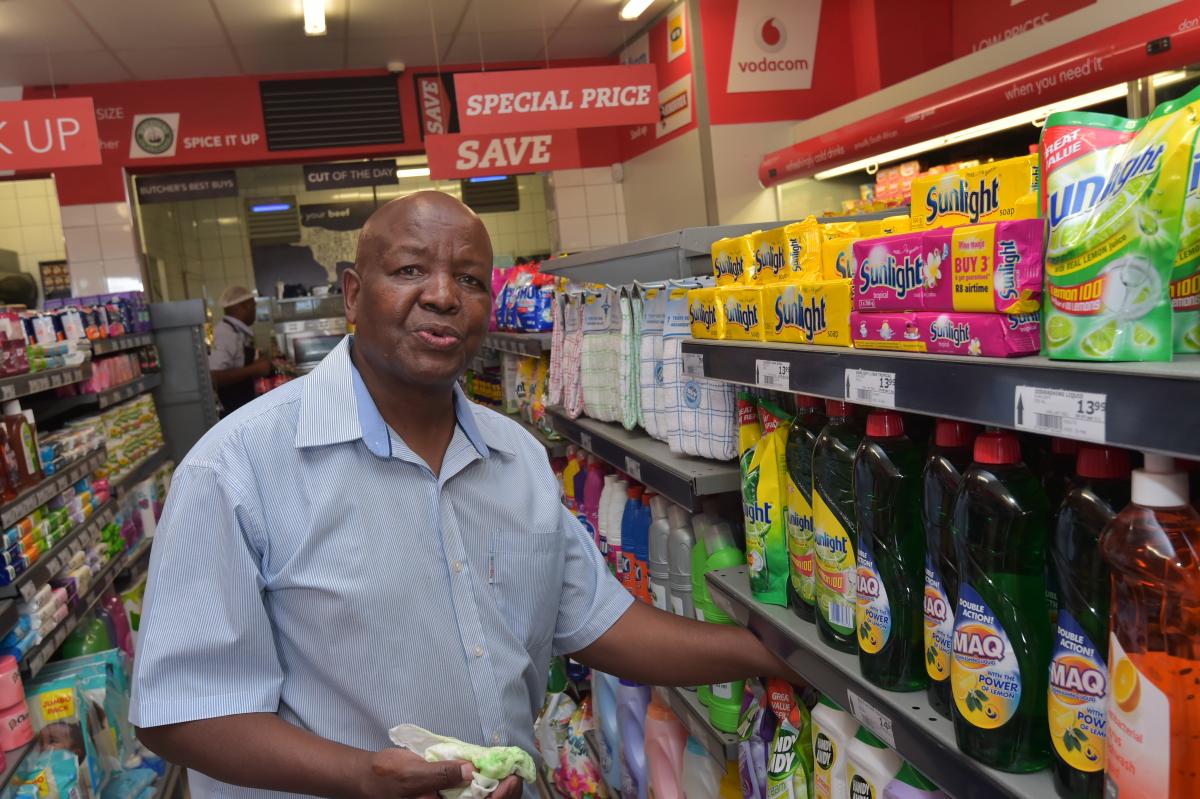 Pilot project
Pilot project
The department is currently running a pilot project in Diepkloof, Soweto, with Solly Legae, the owner of Monageng Market Store.
When Legae and other spaza shop owners saw that their businesses were not growing, they spoke to the provincial government to get assistance. That’s how the partnership with the GEP was started.
He said at times it was difficult running his business because of stiff competition from other spaza shops, especially the foreign-owned spaza shops.
“It was then that we decided to come together and buy stock in bulk but still it was not enough. However, things started to improve with the help of GEP and PnP,” he said.
“We remain astonished by the performance. For example, they have grown their sales to over 300 000 units per month in March. In February, they sold over 177 000. This has a direct impact on their revenue as well. Further, PnP continues to provide support through weekly mentorship to ensure that this pilot succeeds,” added Manenzhe.
Monageng Market Store is a family-owned business that has been operating since 1972 and has been passed on from generation to generation.
Since the pilot project was established in February this year, sales at Monageng Market Store have increased.
From an early age, Legae knew that he was destined to become a businessman. Legae’s mother sold amagwinga (fat cakes) and his father owned a butchery.
It came as no surprise when he left his job as a teacher to focus on running his father’s butchery.
“I don't regret leaving my job to focus on my first love, running a business,” said the 58-year-old father of three.
Manenzhe said there are plans to implement the same model in other areas of the province.
“We need to conclude the blue-print from the pilot at Monageng Market Store, then roll it out across five regions of the province.
“We have already started the process of identifying more spaza shops. It must be noted that whilst the pilot was with PnP, we will roll out more sites with other retail stores.
“We have concluded an agreement with MassMart, and have started engaging the Consumer Goods Council of South Africa.”
Training empowers informal traders
Training empowers informal traders JoyMore than 100 informal traders have been empowered with skills to run their businesses efficiently and manage their finances.
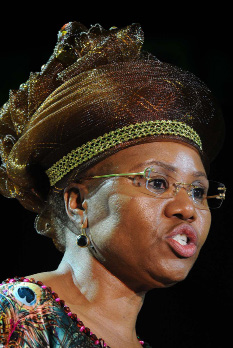 Small Business Development Minister Lindiwe Zulu handed over certificates to 136 informal traders after they completed entrepreneurship training through a partnership between the Department of Small Business Development and the Wholesale and Retail SETA.
Small Business Development Minister Lindiwe Zulu handed over certificates to 136 informal traders after they completed entrepreneurship training through a partnership between the Department of Small Business Development and the Wholesale and Retail SETA.
The traders attended a 10-module training course, which included financial management, merchandising, stock rotation, point-of-sale, marketing and selling skills, personal hygiene, health and food safety.
They were also trained in advertising and promotion, customer care and service, basic financial management, purchasing skills and legal issues. Training was done in partnership with Technical and Vocational Education and Training (TVET) colleges.
Speaking at a graduation ceremony for informal traders in Soweto, Zaida Krauser said the course had been enlightening and had helped her become confident as a businesswoman.
“This course has been helpful, especially for women who stay in Eldorado Park because we usually lack information. This course has empowered me and it makes me want to do better as an individual,” she said.
Krauser, who runs a catering company, said she is grateful for the opportunity because during the training she met nine other informal traders and they have formed a support group.
“Each week we give one person from the group R300 each to use towards their business. We also advise each other if we are facing challenges and encourage each other to be better individuals,” she said.
The group also does referrals for each other as they have different businesses.
Queeni Peterson, who sells groceries in Eldorado Park, said when the opportunity to attend the training came, she grabbed it with both hands.
“This was a great learning experience. This has shown me that government really cares about us because the information we received will help us to grow our businesses,” she said.
Minister Zulu said her department has established two instruments that are earmarked for the support and upliftment of informal and micro businesses.
“The first instrument is the Informal and Micro Enterprise Development Programme (IMEDP), which will put in an investment of up to R80 000 per enterprise through skills development, mentorship and the provision of basic tools and equipment relevant to the business.
“The second scheme is the Shared Economic Infrastructure Facility (SEIF), which we seek to partner with municipalities, government agencies and the private sector for the building of new or upgrading existing infrastructure where informal and micro enterprises operate, mostly in townships and rural areas,” Minister Zulu said.
She said R50 million has been allocated for the roll-out of the Shared Economic Infrastructure Facility and support for informal businesses generally.
According to Minister Zulu, 992 informal traders and 45 informal trader organisations – a total of 1 037 - have been trained in business and retail-related skills so far.
“We are now upscaling the programme. For the 2016/17 financial year, 7 000 informal businesses in the country will be targeted. The dream of building an inclusive economy that benefits all will not be an elusive dream,” Minister Zulu said.
The training forms part of the National Informal Business Upliftment Strategy. The strategy aims to provide informal traders with skills, knowledge and support. For more information call: 0861 843 384
International soccer tournament brings hope
International soccer tournament brings hope JoySports, arts, culture
The future looks bright for twin Thubelihle and Sphumelele Shamase (14) from Waterloo KwaZulu-Natal. This after the pair were chosen to be part of the Under 15 girl soccer team that will represent eThekwini Municipality and Africa in the One Nation Cup tournament in Germany end of May.
The twins Thubelihle and Sphumelele lost their mother when they were only a month old and they are currently living with their grandmother in an RDP house. Although their upbringing may have been difficult, there is hope for them in sport.
The One Nations Cup is a football festival that takes place every two years. This year’s tournament is scheduled to take place on 30 May to 04 June 2016. The eThekwini Municipality Sports Development and Recreation Department Manager Lona Benya told Vukuzenzele that the tournament forms part of the Sister Cities programme.
“The twins are the engines of the team that is why they were selected to part of the team. They have displayed the love of soccer from a very tender age. Before they joined the municipality team in 2013 they were part of the boys’ team in the area. We have no doubt that they will make us proud there.”
They will play with teams from Germany, Spain, Japan, China, Brazil and different European Countries.
Thubelihle said they are very grateful to be part of the team of the municipality team.
“It means a lot to us. Our dream to play soccer in a professional level and we thank municipality for opening doors for us. In few years to come we will be playing with Amanda Dlamini in Banyana Banyana team. Just watch the space,” Thubelihle said excitedly.
The twins’ grandmother, Hloniphile Mbatha said she was surprised to hear that the girls had been selected to be part of the team that will represent the municipality because she wasn’t aware of their talent.
“This came as a shock to me. I usually hear the neighbours say my grandchildren play football very well. I have never seen them play, but when I received a phone call from the municipality informing me that they were selected to be part of the team going to Germany. I asked myself could this be the beginning of their football career. I asked myself if this could be the Lord Almighty’s plan to get us out of poverty,” said Mbatha.
The City’s Acting Deputy Head of Sports Development and Recreation Department Sandra Khathi said the team is ready and prepared to leave for Germany on May 28.
“We appeal to citizens of eThekwini to support our kids as they will be representing not only themselves there but all of us,” she said.
Eastern Cape schools get sport equipment
Eastern Cape schools get sport equipment JoySports, arts, cutlture
Sport and Recreation Minister Fikile Mbalula recently handed over sport equipment and attire to several schools in the Eastern Cape.
During his visit to the province, Minister Mbalula handed over football and netball kits, among others, to several schools, including Walmer High School in Port Elizabeth.
The handover of the sports equipment formed part of the Minister’s Sport Outreach Programme in Port Elizabeth and Uitenhage. The programme is part of the Department of Sport and Recreation’s ongoing school development initiative.
Minister Mbalula said it is important to give all pupils equal opportunities.
“As government, we must continue to ensure that township and rural communities are equally equipped to play and take part in sport and recreational activities. This emanates from our School Sport Plan, which seeks to level the playing field and transform sport in South Africa,” said Minister Mbalula.
